Filter by

Czech Broadside Ballads as Text, Art, Song in Popular Culture, c.1600–1900
This landmark collection makes a major contribution to the burgeoning field of broadside ballad study by investigating the hitherto unexplored treasure-trove of over 100,000 Central/Eastern European broadside ballads of the Czech Republic, from the 16th to the 19th century. Viewing Czech broadside ballads from an interdisciplinary perspective, we see them as unique and regional cultural phenome…
- Edition
- Ed. 1
- ISBN/ISSN
- 9789463721554, 9789048553341
- Collation
- 500
- Series Title
- -
- Call Number
- 940 CZE c

Kafka and Wittgenstein : The Case for an Analytic Modernism
In Kafka and Wittgenstein, Rebecca Schuman undertakes the first ever book-length scholarly examination of Ludwig Wittgenstein’s philosophy of language alongside Franz Kafka’s prose fiction. In groundbreaking readings, she argues that although many readers of Kafka are searching for what his texts mean, in this search we are sorely mistaken. Instead, the problems and illusions we portend to …
- Edition
- -
- ISBN/ISSN
- 9780810131507
- Collation
- 272 halaman
- Series Title
- -
- Call Number
- 800 SCH k
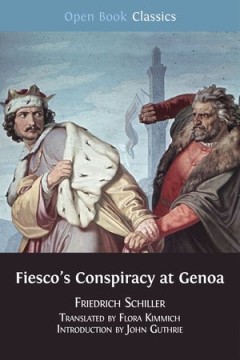
Fiesco's Conspiracy at Genoa
Within two years of the success of his first play Die Räuber on the German stage in 1781, Schiller wrote a drama based on a rebellion in sixteenth century Italy, its title: The Conspiracy of Fiesco at Genoa. A Republican Tragedy. At the head of the conspiracy stood Gian Luigi de’ Fieschi (1524–1547), Schiller’s Count Fiesco, a clever, courageous and charismatic figure, an epicurean and u…
- Edition
- -
- ISBN/ISSN
- 9781783740444
- Collation
- 150 halaman
- Series Title
- Open Book Classics Volume: 2
- Call Number
- 800 SCH f
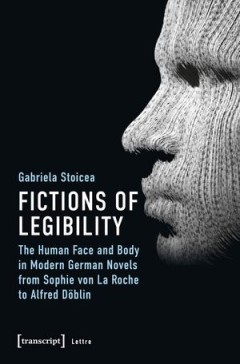
Fictions of Legibility : The Human Face and Body in Modern German Novels from…
Gabriela Stoicea examines how the incidence and role of physical descriptions in German novels changed between 1771 and 1929 in response to developments in the study of the human face and body. As well as engaging the tools and methods of literary analysis, the study uses a cultural studies approach to offer a constellation of ideas and polemics surrounding the readability of the human body. By…
- Edition
- -
- ISBN/ISSN
- 9783839447208
- Collation
- 200 halaman
- Series Title
- -
- Call Number
- 800 STO f

John Donne's Christian Vocation
John Donne’s poetry is often difficult and perplexing, even more so because it undergoes a shift away from secular topics after he converts and begins to lead a religious life. Robert S. Jackson’s John Donne’s Christian Vocation is one of the first studies that takes seriously the ways that Donne’s Christian vocation permeates all of Donne’s writings, not just those after his conversi…
- Edition
- -
- ISBN/ISSN
- 9780810138476
- Collation
- 200 halaman
- Series Title
- -
- Call Number
- 800 JAC j
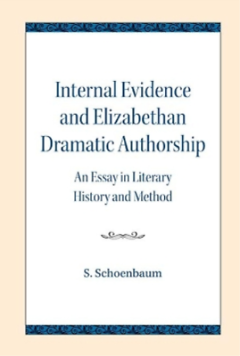
Internal Evidence and Elizabethan Dramatic Authorship : An Essay in Literary …
Internal Evidence and Elizabethan Dramatic Authorship provides one the earliest attempts to write a theoretical method for evidence within plays to help determine authorship or to help distinguish the work of one author from another. Samuel Schoenbaum’s study remains valuable, for the attempt to attribute unattributed plays to one or another author remains an ongoing conversation within early…
- Edition
- -
- ISBN/ISSN
- 9780810138674
- Collation
- 304 halaman
- Series Title
- -
- Call Number
- 800 SCH i

The Ideologies of Lived Space in Literary Texts : Ancient and Modern
In a brief essay called Des espaces autres (1984) Michel Foucault announced that after the nineteenth century, which was dominated by a historical outlook, the current century might rather be the century of space. His prophecy has been fulfilled: the end of the twentieth century witnessed a ‘spatial turn’ in humanities which was perhaps partly due to the globalisation of our modern world. I…
- Edition
- -
- ISBN/ISSN
- 9789038221021
- Collation
- -
- Series Title
- -
- Call Number
- 800 HEI i
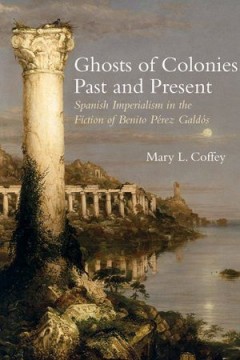
Ghosts of Colonies Past and Present : Spanish Imperialism in the Fiction of B…
Ghosts of Colonies Past and Present is the first comprehensive examination of how the literary production of Benito Pérez Galdós, widely considered Spain’s greatest nineteenth-century novelist, addresses the impact of imperial loss on the citizens of Spain. Well before the events that would lead inexorably toward 1898, Galdós’s texts question the nature of Spanish imperialism and the eff…
- Edition
- -
- ISBN/ISSN
- 9781789622133
- Collation
- -
- Series Title
- -
- Call Number
- 800 COF g

George Eliot's Religious Imagination : A Theopoetical Evolution
In this study, Orr attributes to George Eliot an ‘incarnational aesthetic' and reads her work in the light of it. Writing, she argues, might be said to have become the novelist's religion and ‘its most recognizable tenet was the living out of incarnation'. Here, Orr examines Eliot's works more or less chronologically because of the deeply evolutionary quality to Eliot's career. In a…
- Edition
- -
- ISBN/ISSN
- 9780810135895
- Collation
- -
- Series Title
- -
- Call Number
- 800 ORR g
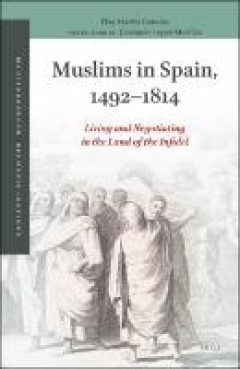
Muslims in Spain, 1492-1814: Living and Negotiating in the Land of the Infidel
In Muslims in Spain, 1492-1814: Living and Negotiating in the Land of the Infidel, Eloy Martín-Corrales surveys Hispano-Muslim relations from the late fifteenth to the eighteenth centuries, a period of chronic hostilities. Nonetheless there were thousands of Muslims in Spain at that time: ambassadors, exiles, merchants, converts, and travelers. Their negotiating strategies, and the necessary s…
- Edition
- -
- ISBN/ISSN
- 9789004443761
- Collation
- -
- Series Title
- -
- Call Number
- -
 Computer Science, Information & General Works
Computer Science, Information & General Works  Philosophy & Psychology
Philosophy & Psychology  Religion
Religion  Social Sciences
Social Sciences  Language
Language  Pure Science
Pure Science  Applied Sciences
Applied Sciences  Art & Recreation
Art & Recreation  Literature
Literature  History & Geography
History & Geography